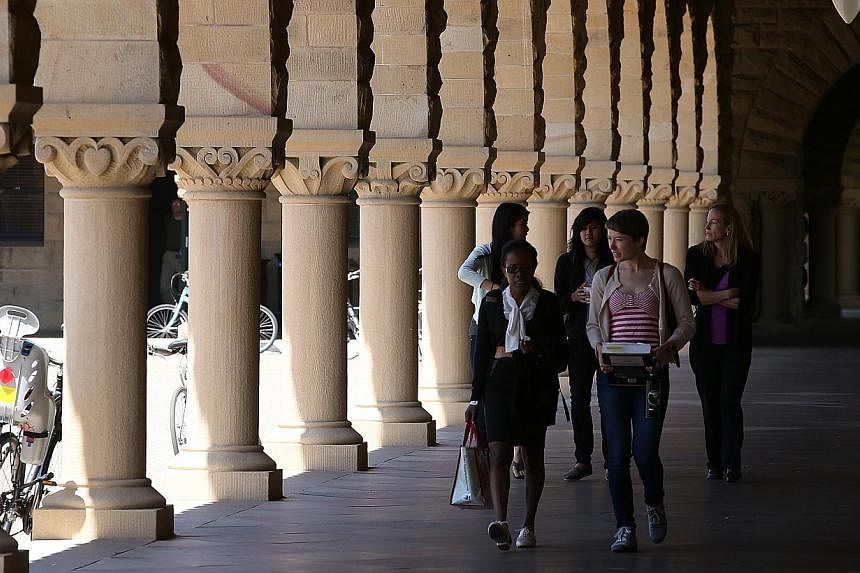Ouyang Xiangyu was described by her Stanford University colleagues as a nice, quiet and shy girl. She was not very confident when it came to her work and appeared to be under some stress, they also told police.
But they never suspected the 27-year-old bespectacled Singaporean was allegedly behind a series of mysterious occurrences at the Nusse Lab, from sabotage to the presence of paraformaldehyde (PFA) in her lab mates' water.
Ouyang became a full member of the Nusse Lab last June, according to fellow researcher Youngsoo Rim, who acted as her mentor. Part of the Stanford School of Medicine, the laboratory is run by Professor Roel Nusse.
Some time in the middle of August, Ms Rim found that stem cells she had successfully grown in the past kept dying.
For two months, she failed to figure out what was going wrong. She first thought she was making a mistake, and then suspected a problem with the incubator that she used to grow the cells.
But on Oct 23, she saw Ouyang standing in front of an incubator that was used only by her. She asked Ouyang what she was doing but was never given a clear answer. That was when she suspected that Ouyang was targeting her.
But before going to see Prof Nusse, she set up an experiment to see if this was true.
She placed a group of cells with her name in an incubator. Then she placed another set, this time mislabelled, in another incubator.
Those with her name died. The mislabelled cells survived. That confirmed her suspicions. Video footage later revealed Ouyang entering the incubator room where Ms Rim was growing cells.
Over the same period, the lab was plagued by another mystery.
In September, when graduate student Xing Liujing drank from her water bottle, she felt an immediate burning sensation in her throat and mouth. She also noticed that the water in her bottle smelt like PFA, a chemical the lab researchers were familiar with.
From then on, Ms Xing began smelling the water in her bottle each time before drinking. She would later tell police that she detected the smell about four times a week over two to three months.
Another researcher, Ms Zhao Ludan, also had similar experiences - with the first happening in October. In early November, she forgot to smell her water. Taking a big swig, she felt a burning sensation in her throat, her eyes became irritated, and she began to salivate uncontrollably.
She threw away her bottle and was heard shouting: "I think someone is trying to kill me!"
When this latest incident came to the campus' attention, Ouyang was already the prime suspect in the sabotage case.
The university decided to act and had her placed under involuntary psychiatric hold. During this time, she allegedly called the university's dean to admit that she did some bad things and begged not to be kicked out.
On Nov 16, Ouyang was released from hospital into the care of her mother, who had flown there from Singapore. They went to pack her belongings from her campus residence, having been told to stay away from the campus by the university. Two police officers were waiting for her.
She agreed to speak to them about the incidents, and hardly needed prompting, according to officer Mike Kim, one of those who interviewed her.
Ouyang said she started to suffer from severe insomnia and dizziness from September, sometimes feeling "disconnected" from reality. A counsellor referred her to a psychiatrist, who gave her anti- depressants. But she stopped taking them as they made her headaches worse, she said.
She admitted putting Trypsin, an enzyme that degrades proteins, in her own cell cultures to kill them, and those belonging to Ms Rim. She could not explain why she did it.
She also said that when she went to a room where Ms Rim kept her cells, it seemed as if she was in a state very much like sleepwalking. She claimed that, at the time, she was unstable and often suffered from dizziness, which caused her to be not fully conscious of what she was doing.
When it came to poisoning her lab mates, she said it started with her putting dishwashing detergent into her own water at her residence and drinking it.
Then at the lab, she put random chemicals, including PFA, into her water bottle. She admitted putting PFA into at least two other water bottles near where she sat in the lab, but insisted she did not know who they belonged to.
When asked if she was trying to kill people by spiking their water with PFA, she said "no". But she agreed that what she did was wrong. She also said she had no personal problems with either Ms Xing or Ms Zhao, and that they had never been mean to her.
She told police: "I am truly sorry for what had happened, but I really did not mean to harm people. It was me crying out for help and I didn't know."
She was arrested after the interview. Her lawyer Adrienne Dell has requested from the court that she be examined by a mental health expert.
According to Ms Zhao, Ouyang was worried that her project would not be successful. At the beginning, she also had a tendency to "latch" onto a colleague and ask a lot of questions.
Ms Xing told police that Ouyang would ask about her boyfriend, who works in the same building, and her previous relationships. Ouyang told her she wanted to have a boyfriend but was nervous as she never had one.
Ms Rim said Ouyang put a lot of pressure on herself and was stressed about succeeding in graduate school. "She was always looking far ahead in the the future and getting worried."


